|
|
|
Sort Order |
|
|
|
Items / Page
|
|
|
|
|
|
|
| Srl | Item |
| 1 |
ID:
190415
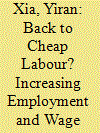

|
|
|
|
|
| Summary/Abstract |
After nearly two decades of rising wages for those in the unskilled sectors of China's economy, in the mid-2010s employment and wages in China began to experience new polarizing trends. Using data from the National Bureau of Statistics of China, this paper examines trends in multiple sectors and subeconomies of China, revealing the substantial rise of employment in informal, low-skilled services as well as the steady decline of wage growth in the informal subeconomy. At the same time, we find that although employment growth in the formal subeconomy is relatively moderate, wage growth in high-skilled services is steadily rising. These two trends pose a challenge for China, presenting a new and uncertain period of economic change.
|
|
|
|
|
|
|
|
|
|
|
|
|
|
|
|
| 2 |
ID:
170102


|
|
|
|
|
| Summary/Abstract |
New economic geography (NEG) models predict that costly transport and the spatial distribution of demand affect the profits firms can earn in different locations, leading to higher wages for workers employed in cities with better geographic access to markets. In light of the ongoing economic integration and market reforms that occurred in China after 1995, we use three waves of Chinese Household Income Project (CHIP) data to measure the extent to which the influence of market access on wages changed and affected wage dispersion across Chinese cities over the next 12 years. Employing the gravity-based method of Redding and Venables (2004) to calculate the market access available to firms located in each city, we test whether the elasticity of the wage with respect to local market access increased over time. We find that in all three years market access of the worker's location has a positive and significant influence on the wage. Consistent with extensive labor market reforms of the late 1990s, the estimated wage elasticity doubles between 1995 and 2002 and is stable thereafter. Our estimates indicate that wages of all workers become more responsive to market forces in a manner consistent with NEG predictions, both skilled and unskilled and those working for state as well as private enterprises. We also provide evidence that these results are not driven by omission of other forms of agglomeration or by selection bias. Estimated spatial differences in nominal wages are large: a worker moving from an inland location to the coast in 2007 would have doubled his or her nominal wage. Counterfactual analysis indicates that spatial differences in market access contribute to wage inequality, but less so over time.
|
|
|
|
|
|
|
|
|
|
|
|
|
|
|
|
| 3 |
ID:
162650
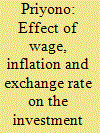

|
|
|
|
|
| Summary/Abstract |
The purpose of this study is to know and analyze the effect of wage variables on regional investment policy, the influence of inflation variables on regional investment policy, and the influence of exchange rate variables on investment policy of the Region on Labor. In this study, the population taken is the entire workforce whose data comes from the Central Bureau of Statistics in Sidoarjo which amounted to 64,792 workers. Data analysis using multiple linear regressions with the help of SPSS program version 20 showed that there is an influence of wages, inflation, and exchange rate on local investment policy. Based on the results of calculations and test results conducted, it can be explained that there is an effect of wages on regional investment of labor followed by the characteristics of inflation on labor that affects the exchange rate of investment. This illustrates for policymakers which empirical evidence exists in a series of time to test the theoretical basis while establishing fiscal, monetary, or exchange rate policies to stabilize output and employment by using interest rates, money supply, and exchange rates as instruments for achieving goals.
|
|
|
|
|
|
|
|
|
|
|
|
|
|
|
|
| 4 |
ID:
145580
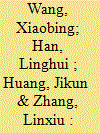

|
|
|
|
|
| Summary/Abstract |
The goal of the present paper is to examine how the expansion of the economy from 2000 has affected rural off-farm labor market participation. Specifically, we seek to determine whether off-farm labor increased after 2000, what forms of employment are driving trends in off-farm labor and whether gender differences can be observed in off-farm employment trends. Using a nationally representative dataset that consist of two waves of surveys conducted in 2000 and 2008 in six provinces, this paper finds that off-farm labor market participation continued to rise steadily in the early 2000s. However, there is a clear difference in the trends associated with occupational choice before and after 2000. In addition, we find that rural off-farm employment trends are different for men and women. Our analysis also shows that the rise of wage-earning employment corresponds with an increasing unskilled wage for both men and women.
|
|
|
|
|
|
|
|
|
|
|
|
|
|
|
|
| 5 |
ID:
086581


|
|
|
|
|
| Publication |
2009.
|
| Summary/Abstract |
This paper evaluates the role of economic geography in explaining regional wages in China. It investigates the extent to which market proximity can explain the evolution of wages, and through which channels. We construct a complete indicator of market access at the provincial level from data on domestic and international trade flows; this is introduced in a simultaneous-equations system to identify the direct and indirect effect of market access on wages. The estimation results for 29 Chinese provinces over 1995-2002 suggest that access to sources of demand is indeed an important factor shaping regional wage dynamics in China. We investigate three channels through which market access might influence wages beside direct transport-cost savings: export performance, and human and physical capital accumulation. A fair share of benefits seems to come from enhanced export performance and greater accumulation of physical capital. The main source of influence of market access remains direct transport costs.
|
|
|
|
|
|
|
|
|
|
|
|
|
|
|
|
| 6 |
ID:
118230
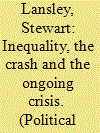

|
|
|
|
|
| Publication |
2012.
|
| Summary/Abstract |
The rise in inequality across many rich nations, but especially in the United Kingdom and the United States, was meant to lead to a bigger economic pie from which all would benefit. In fact, the increased concentration of income over the last three decades has led to more fragile and unstable economies making it a key cause of the 2008 Crash and today's lack of recovery. The evidence of the last 100 years is that models of capitalism that fail to share the proceeds of growth more evenly will eventually self-destruct. More equal societies have softer business cycles. In contrast, more unequal economies are associated with more extreme cycles-they have exaggerated booms, deeper falls and extended troughs. The scale of inequality is not just an issue about fairness and proportionality, it is therefore integral to economic health.
|
|
|
|
|
|
|
|
|
|
|
|
|
|
|
|
| 7 |
ID:
165366


|
|
|
|
|
| Summary/Abstract |
During the last decade, Bangladesh economy grew consistently over 6 per cent annually; however, growth rate in the agriculture sector declined. Labour away from agriculture is evident; it is also evident real wages in the agriculture sector are rising. This could be an indication that Bangladesh is moving to a different stage of economic development. This article investigates whether Bangladesh is approaching a stage of economic development where marginal productivity of labour equals its price, called the Lewis turning point (LTP). We find that the reallocation of labour away from agriculture has had a positive but insignificant impact on economic growth in Bangladesh. We also find that the surplus agricultural labour has not fully been absorbed by the economy. Therefore, we conclude Bangladesh has yet to reach the LTP and suggest initiating policies (e.g., job creation in the service sector) that might speed up the country’s movement to the LTP.
|
|
|
|
|
|
|
|
|
|
|
|
|
|
|
|
| 8 |
ID:
160540


|
|
|
|
|
| Summary/Abstract |
This study reviews the developments in Indonesia’s labour markets during the Joko “Jokowi” Widodo presidency. It is set in the context of changing employment, wages and productivity since the Asian Financial Crisis and under the previous (Yudhoyono) government. We argue that Jokowi’s approach as a former businessman—aided by his like-minded vice-president, Jusuf Kalla—together with macroeconomic developments, has been positive for employment and wages, although less so for labour productivity. Formal sector jobs have continued to grow rapidly and recover somewhat in manufacturing, while the downward trend in unemployment has been sustained. Reform of the minimum wage setting processes has not endeared the president to vocal union groups, but appears to have moderated minimum wage increases close to the main industrial centres. At the same time, a wider wage gap has emerged between permanent and casual workers, which could have contributed to the rising inequality in the country. In an attempt to boost productivity, the current administration has put considerable effort into improving skills that are in demand. However, progress is likely to be slow mainly because of the low quality of basic schooling.
|
|
|
|
|
|
|
|
|
|
|
|
|
|
|
|
| 9 |
ID:
167741
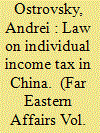

|
|
|
|
|
| Summary/Abstract |
On August 31, 2018, China's Law on Individual Income Tax was drastically amended yet again. Given the rapidly growing incomes of the public and precipitously worsening social differentiation in China's society, these amendments stipulate a higher individual income tax on persons who make noticeably more money than most others. Also, the untaxed minimum has been raised considerably; persons whose income is under 60,000 yuan a year are exempt from income tax payments.
|
|
|
|
|
|
|
|
|
|
|
|
|
|
|
|
| 10 |
ID:
101497


|
|
|
|
|
| Publication |
2010.
|
| Summary/Abstract |
The objective of this analysis is mainly to construct an intuitive measure of the performance of the National Rural Employment Guarantee Scheme (NREGS) in India. The focus is on divergence between demand and supply at the district level. Some related issues addressed are: (i) whether the gap between demand and supply responds to poverty; and (ii) whether recent hikes in NREGS wages are inflationary. Our analysis confirms responsiveness of the positive gap between demand and supply to poverty. Also, apprehensions expressed about the inflationary potential of recent hikes in NREGS wages have been confirmed. More importantly, higher NREGS wages are likely to undermine self-selection of the poor in it.
|
|
|
|
|
|
|
|
|
|
|
|
|
|
|
|
| 11 |
ID:
103936


|
|
|
|
|
| Publication |
2011.
|
| Summary/Abstract |
When there is substantial variation in the quality of colleges and universities, estimating returns to higher education based on quantity of education alone can be misleading. This paper examines the relationship between returns to higher education and college quality in China. We find that returns to higher education vary significantly depending on school quality. In addition, we find that the relationship between earnings and school quality is stronger for cohorts of workers that have entered the workforce more recently. This finding may result from the fact that as the transition toward a market system progresses in China, the wage system becomes increasingly responsive to key components of human capital. We also find that the earning gap between graduates from lower-quality colleges and those from vocational/technical schools decreases over time. Our results may help to inform individual decision-making on investment in education, effective expansion of the higher education system, and efficient resource allocation across different levels of the education system.
|
|
|
|
|
|
|
|
|
|
|
|
|
|
|
|
| 12 |
ID:
123527


|
|
|
|
|
| Publication |
2013.
|
| Summary/Abstract |
This article analyses the widely reported increase of unfree labour in Africa through neoliberalism, arguing that, far from an individual relationship of domination epiphenomenal to global political-economic restructuring, unfree labour must be understood as a social relationship of insecurity and exploitation whose acceleration in recent decades is traceable to broader shifts in the relations of production and social reproduction. These include the impact of labour market reform and privatisation on wages, employment and poverty; the rise of informalisation, including the marketisation of social reproduction; Africa in the international division of labour and labour conditions in global supply chains; and the rise of brics, the 'new scramble' for African resources and markets, and intensified processes of primitive accumulation. In a continent beleaguered by the slave trade and the systematic, widespread and brutal exploitation of forced labour during the colonial era, concerns around labour conditions of violence, bondage and coercion are particularly acute. Understanding the complexities of labour unfreedom in Africa today requires an understanding of the various forms and layers of coercion, immobility and exploitation fundamental to the contemporary social structures of capitalist accumulation, overcoming the binary typically posited between free and unfree labour.
|
|
|
|
|
|
|
|
|
|
|
|
|
|
|
|
| 13 |
ID:
110503


|
|
|
|
|
| Publication |
2011.
|
| Summary/Abstract |
When examining questions regarding the Lewis model, one of the most salient set of facts involves the shift of labor between agricultural and the off farm sectors. The goal of this paper is to answer several questions about the nature of this movement: How has the expansion of the economy after 2000 affected off farm labor market participation? Has off farm labor continued to rise? What is this rise being driven by-migrant wage earners or self employment opportunities? What is, in part, driving these trends? Using a national representative set of data that consists of two waves of surveys done in 2000 and 2008 in six provinces, the paper finds that off farm labor market participation has continued to rise steadily in the early 2000s. However, there has been a structural break in the trends of occupational choice before and after 2000. Unlike before 2000, after 2000 migration's growth accelerated; during this same period the self employed subsector stagnated. The number of wage earning migrants in 2008 was greater than the number of those in the self employed subsector. The data also show that the rise in wage-earning migration is mainly being driven by the younger cohorts. Our analysis also shows that the rise of migration is happening in conjunction with a rising unskilled wage.
|
|
|
|
|
|
|
|
|
|
|
|
|
|
|
|
| 14 |
ID:
117487
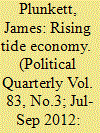

|
|
|
|
|
| Publication |
2012.
|
| Summary/Abstract |
For all its rhetorical potency, the policy implications of the 'squeezed middle' are yet to be fully explored. This article looks at what the phenomenon means for the design and prosecution of progressive economic policy. It argues that any progressive government today needs to adopt a new first order goal of economic policy: ensuring that the material wellbeing of ordinary working people rises when the economy grows, a project referred to as 'building a rising tide economy'. This objective would sit in addition to the traditional goals of sustained GDP growth, high employment, low inflation and poverty reduction. It would have real implications across a range of important policy areas.
|
|
|
|
|
|
|
|
|
|
|
|
|
|
|
|
| 15 |
ID:
141428
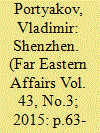

|
|
|
|
|
| Summary/Abstract |
The author looks at the unusual demography in Shenzhen and shows the ways the city residents use to cross the different status lines dividing them. He also gives a brief outline of job opportunities, wages, and social security provided to people through employment. Finally, he adds a word of praise for the labor unions and nongovernmental organizations for their prominent role in Shenzhen.
|
|
|
|
|
|
|
|
|
|
|
|
|
|
|
|
| 16 |
ID:
160405


|
|
|
|
|
| Summary/Abstract |
Vietnam in 2017 continued rapid economic growth and consolidated its role in APEC. US withdrawal from the TPP harmed growth prospects, but Vietnam and other trading partners pushed ahead with other agreements. Industrial production continued to boom, and real wages rose substantially. The ruling party consolidated its hold on national politics and stepped up repression of activists.
|
|
|
|
|
|
|
|
|
|
|
|
|
|
|
|
| 17 |
ID:
029169


|
|
|
|
|
| Publication |
Bombay, Asia Publishing House, 1971.
|
| Description |
xx, 362p.
|
| Standard Number |
0210223065
|
|
|
|
|
|
|
|
|
|
|
|
Copies: C:1/I:0,R:0,Q:0
Circulation
| Accession# | Call# | Current Location | Status | Policy | Location |
| 008212 | 331.21/SIN 008212 | Main | On Shelf | General | |
|
|
|
|
| 18 |
ID:
119402
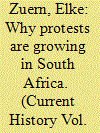

|
|
|
|
|
| Publication |
2013.
|
| Summary/Abstract |
While the ANC retains a firm grip on power, factionalism within the party, corruption, and an increasing distance from ordinary people undermine its ability to deliver on its promises.
|
|
|
|
|
|
|
|
|
|
|
|
|
|
|
|
| 19 |
ID:
176816


|
|
|
|
|
| Summary/Abstract |
An important and poorly understood question when communities consider wind power investments is whether the local population will benefit financially. I examine the effect of wind power investment on wages in rural counties in the US. I combine quarterly panel data on wages with data on all wind power plant investments larger than 1 megawatt (MW). Using a Bayesian multilevel model estimated by MCMC, I estimate a significant positive effect, with a magnitude consistent with a 2% permanent increase in wages following an investment in a large wind farm of 400 MW. However, this effect has large geographic and socioeconomic variation. Counties with low employment tend to see little impact on wages from wind power, potentially because slack in the labor market prevents wages from rising. From a policy perspective, these results are most relevant for local regulators and planners, who seek to balance the benefits and costs of wind farms to the community. This research indicates that wind farms can provide, on average, a modest boost to local wages, with some areas seeing an out-sized effect.
|
|
|
|
|
|
|
|
|
|
|
|
|
|
|
|
| 20 |
ID:
143402


|
|
|
|
|
| Summary/Abstract |
Earnings inequality and earnings determination in urban China 2002 and Russia 2003 are compared by using samples covering large parts of the two countries. The results from estimated earnings functions are put in perspective of the outcome from a similar comparison made at the end of the 1980s. We confirm that earnings inequality has increased rapidly in both countries and is found to be similar across countries. As at the end of the 1980s, the gender wage gap is larger in Russia where earnings reach a maximum at a lower age than in China. The association between education and income in China has increased to become stronger than in Russia. The earnings penalty of being employed in the public service sector in Russia has increased while the publically employed in China enjoy a positive payoff of limited magnitude.
|
|
|
|
|
|
|
|
|
|
|
|
|
|
|
|
|
|
|
|
|